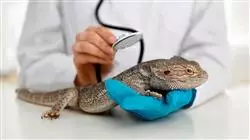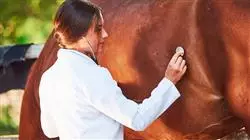University certificate
The world's largest faculty of veterinary medicine”
Introduction to the Program
Veterinarians specializing in Reptiles and Wildlife are a profession of growing demand due to the increase of animals in captivity that require specific care”

In developed countries, the expansion in the general knowledge of reptile care, as well as in medicine and surgery, has resulted in the formation of an excellent level of veterinary professionals, comparable to those specialized in dogs and cats. In the rehabilitation centers for native and exotic fauna it is very important to acquire this knowledge, since it allows to assess the prognosis of each animal upon its arrival at the center.
There are some 6,500 species of reptiles, but only a few are kept in captivity. Even so, the clinical veterinarian must be qualified to receive and treat any species. The pets most commonly received in the daily clinic are iguanas, some species of lizards, turtles and snakes, which, although they are not domestic animals, should be considered non-conventional pets.
Most routine clinical procedures, such as physical examination, laboratory sampling, radiographic studies or ultrasound, among others, can be performed without the use of sedatives or anesthetics. However, gloves should be worn to reduce the possible spread of zoonotic diseases. In some cases, the use of special gloves, surgical masks, goggles or protective screen should be implemented, depending on the ease of handling the patient and his pathology. In addition, it should be noted that it is impossible to recreate the natural environment of reptiles in captivity. Captivity is very stressful for them, which makes them very susceptible to diseases of all kinds.
On the other hand, this Postgraduate diploma also places special emphasis on the work of the zoo and wildlife center veterinarian with respect to medical procedures in captive exotic animals. The veterinarian specialized in this type of animals must be qualified to develop all the rescue tasks, clinical care and reception of the animal, diagnostic techniques and interpretation of results, as well as the application of updated medical and surgical treatments that will be developed throughout this module.
In addition, as it is an online diploma, the student is not constrained by fixed schedules or the need to move to another physical location, but can access the contents at any time of the day, balancing their work or personal life with their academic life as they wish.
We offer you a high level training to increase your competences and skills in the treatment of reptiles and wild animals"
The Postgraduate diploma in Reptiles and Wildlife contains the scientific most complete and up-to-date educational program on the market. The most important features of the program include:
- The development of case studies presented by experts in Reptiles and Wildlife
- The graphic, schematic, and eminently practical contents with which they are created provide scientific and practical information on the disciplines that are essential for professional practice
- The latest news on the diagnosis and treatment of diseases in Reptiles and Wildlife
- Practical exercises where the self-assessment process can be carried out to improve learning
- A special emphasis on innovative methodologies in the field of the diagnosis and treatment of diseases in Reptiles and Wildlife
- Theoretical lessons, questions to the expert, debate forums on controversial topics, and individual reflection assignments
- Content that is accessible from any fixed or portable device with an Internet connection
This Postgraduate diploma is the best investment you can make in selecting a refresher program to update your knowledge of Reptiles and Wildlife"
It includes in its teaching staff, professionals belonging to the veterinary field, who pour into this training the experience of their work, in addition to recognized specialists from reference societies and prestigious universities.
The multimedia content, developed with the latest educational technology, will provide the professional with situated and contextual learning, i.e., a simulated environment that will provide immersive training programmed to train in real situations.
This program is designed around Problem Based Learning, whereby the specialist must try to solve the different professional practice situations that arise during the academic year. For this purpose, the professional will be assisted by an innovative interactive video system created by renowned and experienced experts in Reptiles and Wildlife.
This training comes with the best didactic material, providing you with a contextual approach that will facilitate your learning"

This 100% online Postgraduate diploma will allow you to combine your studies with your professional work while increasing your knowledge in this field"
Why study at TECH?
TECH is the world’s largest online university. With an impressive catalog of more than 14,000 university programs available in 11 languages, it is positioned as a leader in employability, with a 99% job placement rate. In addition, it relies on an enormous faculty of more than 6,000 professors of the highest international renown.

Study at the world's largest online university and guarantee your professional success. The future starts at TECH”
The world’s best online university according to FORBES
The prestigious Forbes magazine, specialized in business and finance, has highlighted TECH as “the world's best online university” This is what they have recently stated in an article in their digital edition in which they echo the success story of this institution, “thanks to the academic offer it provides, the selection of its teaching staff, and an innovative learning method aimed at educating the professionals of the future”
A revolutionary study method, a cutting-edge faculty and a practical focus: the key to TECH's success.
The most complete study plans on the university scene
TECH offers the most complete study plans on the university scene, with syllabuses that cover fundamental concepts and, at the same time, the main scientific advances in their specific scientific areas. In addition, these programs are continuously being updated to guarantee students the academic vanguard and the most in-demand professional skills. In this way, the university's qualifications provide its graduates with a significant advantage to propel their careers to success.
TECH offers the most comprehensive and intensive study plans on the current university scene.
A world-class teaching staff
TECH's teaching staff is made up of more than 6,000 professors with the highest international recognition. Professors, researchers and top executives of multinational companies, including Isaiah Covington, performance coach of the Boston Celtics; Magda Romanska, principal investigator at Harvard MetaLAB; Ignacio Wistumba, chairman of the department of translational molecular pathology at MD Anderson Cancer Center; and D.W. Pine, creative director of TIME magazine, among others.
Internationally renowned experts, specialized in different branches of Health, Technology, Communication and Business, form part of the TECH faculty.
A unique learning method
TECH is the first university to use Relearning in all its programs. It is the best online learning methodology, accredited with international teaching quality certifications, provided by prestigious educational agencies. In addition, this disruptive educational model is complemented with the “Case Method”, thereby setting up a unique online teaching strategy. Innovative teaching resources are also implemented, including detailed videos, infographics and interactive summaries.
TECH combines Relearning and the Case Method in all its university programs to guarantee excellent theoretical and practical learning, studying whenever and wherever you want.
The world's largest online university
TECH is the world’s largest online university. We are the largest educational institution, with the best and widest online educational catalog, one hundred percent online and covering the vast majority of areas of knowledge. We offer a large selection of our own degrees and accredited online undergraduate and postgraduate degrees. In total, more than 14,000 university degrees, in eleven different languages, make us the largest educational largest in the world.
TECH has the world's most extensive catalog of academic and official programs, available in more than 11 languages.
Google Premier Partner
The American technology giant has awarded TECH the Google Google Premier Partner badge. This award, which is only available to 3% of the world's companies, highlights the efficient, flexible and tailored experience that this university provides to students. The recognition as a Google Premier Partner not only accredits the maximum rigor, performance and investment in TECH's digital infrastructures, but also places this university as one of the world's leading technology companies.
Google has positioned TECH in the top 3% of the world's most important technology companies by awarding it its Google Premier Partner badge.
The official online university of the NBA
TECH is the official online university of the NBA. Thanks to our agreement with the biggest league in basketball, we offer our students exclusive university programs, as well as a wide variety of educational resources focused on the business of the league and other areas of the sports industry. Each program is made up of a uniquely designed syllabus and features exceptional guest hosts: professionals with a distinguished sports background who will offer their expertise on the most relevant topics.
TECH has been selected by the NBA, the world's top basketball league, as its official online university.
The top-rated university by its students
Students have positioned TECH as the world's top-rated university on the main review websites, with a highest rating of 4.9 out of 5, obtained from more than 1,000 reviews. These results consolidate TECH as the benchmark university institution at an international level, reflecting the excellence and positive impact of its educational model.” reflecting the excellence and positive impact of its educational model.”
TECH is the world’s top-rated university by its students.
Leaders in employability
TECH has managed to become the leading university in employability. 99% of its students obtain jobs in the academic field they have studied, within one year of completing any of the university's programs. A similar number achieve immediate career enhancement. All this thanks to a study methodology that bases its effectiveness on the acquisition of practical skills, which are absolutely necessary for professional development.
99% of TECH graduates find a job within a year of completing their studies.
Postgraduate Diploma in Reptiles and Wildlife
The animal kingdom is so multifaceted and broad in its levels of study (biological, pathological, ethological, etc.) that virtually every species is a distinct world governed by its own rules and dynamics of development. Committed to deepen the knowledge of wild animal life after seeing veterinary medicine as a multipurpose science beyond the typical pets, TECH Global University offers the Postgraduate Diploma in Reptiles and Wildlife: an online postgraduate course that explores in detail the medical and surgical procedures related to endemic and exotic wildlife, pointing out the particularities of both animals in captivity and those that serve as heterodox pets: turtles, lizards, snakes, etc.. Using an innovative system in terms of methodology and content, we offer you a fascinating training through self-regulated classes that you can access from the device and place of your choice. Thus, we will teach you a whole range of exclusive skills: from taking an intravenous sample from a chelonid to administering drugs to a wild feline.
Get a wildlife veterinary degree
While not as recurrent, atypical pet ownership has become a growing trend. The problem with this hobby lies in the lack of specialists to advise owners on care and in turn attend to health problems in these types of species. There have been cases in the media of snakes and crocodiles kept in poor home conditions. Hence the importance of strengthening veterinary knowledge in the field of reptiles and other wild animals. Using state-of-the-art multimedia content and mentoring from experts in the field, you will be able to interact with a comprehensive curriculum, which includes: creating appropriate facilities for reptiles, hibernation, drug administration, radiography, ultrasound, dermal diseases, anesthesia and surgery of wildlife (ursids, felines, primates), and much more. Looking for a quality degree that will open new career doors? Enroll with us and do it without leaving home.







